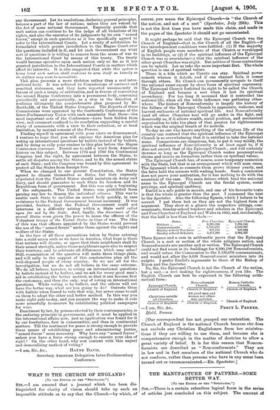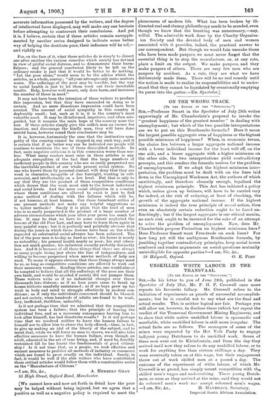THE MANUFACTURE OF PAUPERS.—SOME BETTER WAY.
[To THE EDITOR OF THE " SPECTATOR." J
SIR,—There is a certain relentless logical force in the series of articles just concluded on this subject. The amount of accurate information possessed by the wxiters, and the degree of intellectual force displayed, may well make any one hesitate before attempting to controvert their conclusions. And yet it is, I believe, certain that if these articles remain unsupple- raented by another series designed to indicate some better way of helping the destitute poor, their influence will be nil,—
and rightly so.
For, on the face of it, what these articles do is simply to dissect one after another the various remedies which society has de-vised in view of pitiful social distress, and to demonstrate their harm- fulness ; and the general conclusion likely to be left on the ordinary reader is just that it would be better to do nothing. "Let the poor alone," would seem to be the advice which the articles, as a whole, convey ; "all your attempts only make matters worse. The sufferings of the poor may be terrible, but the way to social health is just to let them work out their inevitable results. Help, however well meant, only does harm, and increases the number of those in need."
It may not have been the intention of these writers to produce this impression, but that they have succeeded in doing so is certain. And no more disastrous impression could have been created. The amount of social sympathy in this country is deplorably small ; but, such as it is, it is the country's most valuable asset. It may be ill-informed, impulsive, and often mis- guided, but it remains the main hope of the country none the less. If these articles simply give the selfish man an excuse for inaction, and discourage the kindly man, they will have done untold harm, however sound their conclusions may be.
It is, however, fortunately the case that the instinctive sym- pathy of the country cannot be stopped in any such way, and it is certain that if no better way can be indicated our people will continue to maintain the use of these discredited methods. In fact, mere negative criticism is in this connexion worse than use- less. What many readers must miss in these articles is any adequate recognition of the fact that the large numbers of inefficient people in this country who are so easily pauperised are the inevitable product of our whole present social system. No one who knows them by personal contact will deny that they are weak in character, incapable of due foresight, wanting in self- restraint, and intellectually on a low level. But that is only to say that they are the product of those competitive conditions which decree that the weak must sink to the lowest industrial and social levels. And the main social obligation in a country where those conditions are allowed to exist is just to find some method of dealing with the failures which will be, if not humane, at least human. Can these trenchant critics of our present methods not make any helpful suggestions as to better methods ? Surely it is plain that the kind of man who is so easily pauperised is the product of a large number of adverse circumstances which year after year prove too much for him. It may be that we have to some extent neglected the lessons of the old Poor Law, and may have to learn them again in very painful ways ; but it is perfectly and painfully obvious that during the years in which those lessons have been on the whole regarded no substantial social advance has been achieved. The lot of the poor man is to-day as hard as ever ; his house is nearly as unhealthy ; his general health nearly as poor; his real educa- tion not much greater; his industrial security probably distinctly less. And it is because of all these things that there are always so many people living just above the line of independence, and willing to become pauperised when unwise methods of help are used. To many it appears obvious that these things always must be so, as long as competitive conditions are allowed to work out their necessary results. Reading these articles, one would almost be tempted to believe that all the sufferings of the poor are their own fault, and would be avoided if society did not pamper them. These writers write as if no industrial changes ever threw thousands into distress; as if no lean years came to break up homes hitherto manfully maintained ; as if no boys grew up too weak in body and mind to struggle effectively in modern con- ditions' as if only the individuals,coneerned should be blamed, and not society, when hundreds of adults are found to be weak, lazy, inefficient, thriftless, unhealthy.
Is it not perhaps time that we admitted that the competitive system has been a failure; that the principle of leaving the individual free, and as a necessary consequence leaving him to look after himself, has had disastrous results ? Is it not perhaps time that we resolved neither to leave the human failure to himself nor to allow him to abuse the help offered,—time, in fact, to give up making an idol of the liberty of the subject, and to insist that, while we will leave no man to starve, we will also take effective measures to have the human failure, even though an adult, educated in the art of true living, and, if need be, forcibly restrained till he has learnt the fundamentals of a citizen- ship? ? Is it not time that, as a people, we took effective and earnest measures to prohibit all methods of industry or commerce which are found to press cruelly on the individual. Surely, in fact, it would be well if the able writers who have contributed these critical articles would follow them with a constructive series on the "Manufacture of Citizens."
85 High Street, Oxford Road, Manchester.
[We cannot here and now set forth in detail how the poor may be helped without being injured, but we agree that a positive as well as a negative policy is required to meet the
phenomena of modern life. What has been broken by ill- directed zeal and clumsy philanthropy needs to be mended, even though we know that the breaking was unnecessary,—nay, wilful. The admirable work done by the Charity Organisa- ion Society and the devoted body of men and women associated with it provides, indeed, the practical answer to our correspondent. But though we would fain unmake those who have been made paupers, we must never forget that the essential thing is to stop the manufacture, or, at any rate, place a limit on the output. We make paupers, and they make paupers of others. There are very few men who are paupers by accident. As a rule, they are what we have deliberately made them. There will be no real remedy until the nation is made to realise its responsibilities and to under- stand that they cannot be liquidated by occasionally emptying its purse into the gutter.—ED. Spectator.]







































 Previous page
Previous page